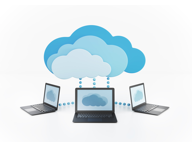Discussions about the benefit of cloud inevitably talk about the amount of savings that businesses could enjoy through the migration process. Traditional network and data systems require a huge amount of capital expenditure, not to mention the inefficiencies that come with handling these processes. With cloud, the barrier to entry is considerably reduced. As a result, even small businesses today can think of achieving operational efficiencies that were hitherto available only to large businesses. But, the economic impact of cloud adoption goes way beyond just these cost savings. Here are some more economic benefits that cloud computing brings.
Waste Reduction :
An increase in use of cloud services come with a commensurate reduction in conventional technologies. Take the electronic signature industry, for instance. According to an estimate by the Legal Marketing Association of USA, there are close to 1.1 million attorneys in the country, and their per capita consumption is 1000 pounds of paper per year. With an increasing awareness of eSignatures, the amount of resources that the economy wastes in producing paper comes down dramatically. Similar benefits are brought about the growing number of cloud-based services for documents, photos and music.
Efficiency Through Consolidation Of Labor
There is often a misconception that cloud computing brings down the number jobs in the organization. This is partly true since a good number of workers employed for managing IT may no longer be required. However, truth is that there is merely a consolidation of labor. Cloud and SaaS does not change the technological aspects of a product – it only changes the way it is delivered. Consequently, people are still required to manage networks and handle software – except that they are now employed by the cloud service providers and not by the individual companies. This is consolidation of labor that is good for the individual workers as well as the businesses involved.
More Jobs
There is no doubt that cloud computing brings about an increase in job opportunities. Just a cursory look at the software engineering job positions will tell you the number of positions that have been created due to the cloud. But we are barely scratching the surface here. As noted earlier, cloud computing has lowered the entry barrier for start-ups to do bigger things that earlier required higher capital. What this means is that there is more competition in the industry today. This means better products for consumers, more jobs and overall, a healthier economy.
This is not all. All cloud computing products and services need physical infrastructure to operate. This implies greater demand for the raw materials, assembling labor and in totality, an overall growth for the supply chain system involved. Research agencies in the industry would do good if an overall economic impact study report is published to analyze the positive implications of cloud computing. Until then, we are bound to see articles like these blaming cloud computing for the economy.

